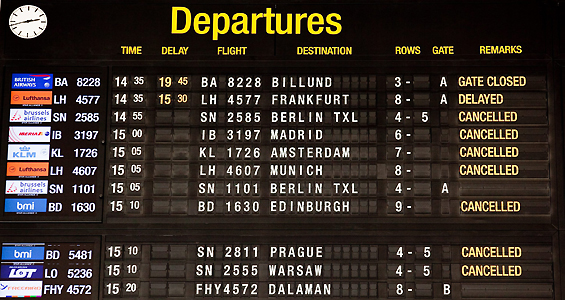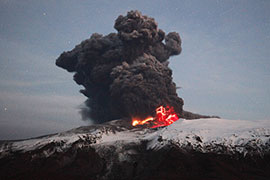Airlines call for flight resumption
Travel chaos continues as European governments come in for criticism over response to ash cloud.

 |
| Flight disruptions have led airlines to lose an estimated $250m a day [AFP] |
The International Air Transport Association (Iata) has urged governments to rethink decisions to close large swathes of European airspace because of the Icelandic volcano’s ash cloud.
The airline industry body expressed its dissatisfaction with the way governments managed the crisis saying there was “no risk assessment, no consultation, no co-ordination, and no leadership”.
Keep reading
list of 4 items‘Mama we’re dying’: Only able to hear her kids in Gaza in their final days
Europe pledges to boost aid to Sudan on unwelcome war anniversary
Birth, death, escape: Three women’s struggle through Sudan’s war
| YOUR MEDIA |
|
Send us your stories, pictures or video here. |
Giovanni Bisignani, the head of Iata, said on Monday that “governments must place greater urgency and focus on how and when we can safely reopen Europe’s skies”, after several European airlines successfully staged test flights through parts of the ash cloud, leading some to question whether the current flight bans are necessary.
While the Iata said “safety is our top priority” Bisignani said member airlines ran test flights with no problems and “they report missed opportunities to fly safely”.
With EU transport ministers set to hold emergency talks by video conference on Monday, Siim Kallas, the EU transport commissioner, said he hoped 50 per cent of European airspace would be risk-free on Monday, adding that “we cannot wait until the ash flows just disappear”.
Diego Lopez Garrido, the Spanish secretary of state for European affairs, said half of the flights planned in Europe could take place on Monday.
Meanwhile, scientists in Iceland believe the ash coming out of the volcano had dropped dramatically.
David Chater, Al Jazeera’s correspondent in Iceland, said: “What appears to be happening is there are now fresh lawa flow coming out of the volcano.
“They say that is very good news. What it means essentially is that the ash itself has formed a cap around the eruptions, which means the ice from the glacier is no longer coming into explosive contact with the lava, with the magma.
“So that phase [of the ash eruptions] they think is now over. But they don’t know what is going on below the surface,” he said.
Ash cloud easing
Most of northern Europe’s airspace has been closed since Thursday, after Iceland’s Eyjafjallajokull volcano erupted, sending ash several kilometres into the air and generating a plume of microparticles across the continent.
| In video |
|
Al Jazeera’s David Chater reports on the |
Iceland’s meteorological office said on Sunday that tremors from the volcano had grown more intense but the column of ash rising from it had eased back to 4-5km from as high as 11km when it began erupting on Wednesday.
Authorities are under pressure to allow flights to resume, with the shutdown costing the aviation industry an estimated $250m a day according to the IATA, stranding thousands of passengers and hurting trade.
Eurocontrol, the European organisation for the safety of air navigation, said only 5,000 flights were made in European airspace on Sunday, compared with 24,000 normally, adding that 63,000 flights had been cancelled since Thursday.
The disruption has spread to Asia, where dozens of Europe-bound flights were cancelled and hotels from Beijing to Singapore strained to accommodate stranded passengers.
Freight company FedEx said more than 100 of its flights headed to Europe had been re-routed, diverted or cancelled over 72 hours.
Test flights
In an effort to get flights going again and stem mounting losses, several major European airlines said they had conducted test flights through the ash cloud without any damage to aircraft.
| iN depth | |||||||||||||||||||||
|
Garrido said Germany’s Lufthansa made 11 flights, Dutch carrier KLM nine, Air France seven, and “the results show no impact in the area … no impact coming from the ash cloud”.
KLM said most European airspace was safe despite the plume of ash, reporting no damage to engines or evidence of dangerous ash concentrations after the test flights.
“We observed no irregularities either during the flight or during the initial inspection on the ground,” Peter Hartman, the KLM chief executive who was on one of the test flights on Saturday, said.
“We hope to receive permission as soon as possible after that to start up our operation and to transport our passengers to their destinations.”
The company despatched two commercial freight flights to Asia on Sunday evening and the association of Dutch pilots said the “concentration of ash particles in the atmosphere is in all likelihood so small that it poses no threat to air transport”.
‘Not the slightest scratch’
Wolfgang Weber, a Lufthansa spokesman, said the airline flew 10 empty long-haul planes to Frankfurt from Munich at low altitude levels between 3,000 and 8,000 metres on Saturday.
“We simply checked every single aircraft very carefully after the landing in Frankfurt to see whether there was any damage that could have been caused by volcanic ash,” he said. “Not the slightest scratch was found on any of the 10 planes.”
 |
| Weather experts say the ash plume is not likely to move far until later in the week [Reuters] |
Air France, too, said it carried out a successful test flight over France, travelling from Charles de Gaulle airport in Paris to Toulouse in southern France.
A British Airways test flight, carrying five people including Willie Walsh, the airline’s chief executive, encountered no difficulties, the airline said on Sunday.
“The conditions were perfect and the aircraft encountered no difficulties. It will now undergo a full technical analysis at British Airways’ engineering base at Cardiff,” the airline said in a statement.
Still, British Airways, along with Irish carrier Aer Lingus, cancelled all their flights for Monday, and Ireland’s Ryanair cancelled flights to and from northern Europe until Wednesday.
Volcanic ash is abrasive and can strip off aerodynamic surfaces and paralyse an aircraft engine. Aircraft electronics and windshields can also be damaged.
Weather experts say wind patterns meant the ash plume was not likely to move far until later in the week, and that a shift in jet stream winds from Thursday could flush it out of most of Europe.
